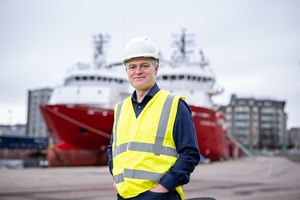OEUK: Offshore industry must churn new oil licenses to ensure domestic energy production
(WO) – Offshore Energies UK has responded to today’s King’s Speech. The speech led on economic growth and outlined the ‘Offshore Petroleum Licensing Bill’ to regularize licensing for the UK’s homegrown oil and gas industry, together with an ambition to attract renewable investment and reform grid connections across the nation.
The proposed annual licensing rounds will only take place if two key tests are met that support the transition to net zero. The first test is that the UK must be projected to import more oil and gas from other countries than it produces at home. The second is that the carbon emissions associated with the production of UK gas are lower than the equivalent emissions from imported liquefied natural gas.
Oil and gas producers contribute £16 billion every year to the UK economy, and it is vital they are given certainty to develop a clear strategy to protect energy supplies at a time of uncertainty over our access to foreign imports. This follows embargoes on Russian energy since Putin’s invasion of Ukraine and the consequences of war in the Middle East.
OEUK estimates that around 200,000 jobs depend on the continuity of North Sea energy companies. The workforce has developed world-leading specialist skills since oil and gas production from the UK Continental Shelf began in the 1970s. About 90% of these workers have skills that can be readily transferred to renewable wind and hydrogen energy production or the growing carbon capture, utilization and storage sectors.
Why does the UK need more oil and gas licenses? Data from NSTA shows the UK only replaced 3% of production with new reserves in 2022, meaning that only 1 new barrel was invested in for every 33 existing barrels produced today (source: NSTA Oil and Gas resources report)
The UK is expected to close production from 20 fields this year, whilst only two will start producing. For every one oil and gas well drilled, around three are closed.
Will the oil and gas produced in the UK be used in the UK? Around 75% of the UK’s total energy comes from oil and gas.
44% of UK gas comes from the North Sea, while produced oil plays an important role in meeting UK, as well as European energy security, where over 70 per cent of the UK’s oil is used (source: OEUK Economic Report 2023).
Will new oil and gas production in UK waters prevent the UK from reaching net zero by 2050? Analysis from the NSTA in July showed that the carbon footprint of domestic gas production is around one-quarter of the carbon footprint of imported liquified natural gas.
As the UK is a rapidly declining producer of oil and gas, new oil and gas licenses reduce the rate of declining UK supplies, rather than increase it above current levels – so that the UK remains on track to meet net zero by 2050.
Does each license represent a new oil field? No. Each license does not represent a new oil field.
Companies require licenses for a range of activity in so-called “blocks” – carefully mapped sections of the seabed in UK waters – starting from seismic and initial exploratory work through to production, either near existing infrastructure in previously known fields or in new fields.
Licensing is a normal part of most energy production regimes and is used in the UK to manage the development of oil and gas, wind and most recently, carbon capture projects. It is part of a bigger process which companies must undertake to explore, analyze, produce and then eventually decommission energy production.
There is a constant churn in domestic production, meaning as reserves are depleted, licensed production is decommissioned, and new licenses are required to simply maintain the rate of decline. The UK’s oil and gas regime is heavily regulated, with applicants for licenses subject to strict commercial, environmental and health and safety conditions.
Offshore Energies UK CEO David Whitehouse, said, “As we transition to net zero, the UK mustn’t just become a good place to do energy business, it must become irresistible. The ambition to attract investment in our renewable infrastructure and reform grid connections is important as we work to unlock the full potential of our integrated offshore energy mix – from oil and gas to wind, hydrogen and carbon capture.
“There are currently 284 active oil and gas fields in the North Sea, and by 2030, around 180 of those will have ceased production due to natural decline. The industry needs the churn of new licenses to ensure no cliff edge in domestic production. OEUK has warned that without fresh investment, the UK will be reliant on oil and gas imports for 80% of its needs by 2030.
“Our sector needs new licenses to manage the decline of oil and gas production in the North Sea. A predictable licensing process with transparent checks will support the highly skilled people working in the sector, while ensuring the granting of new licenses is compatible with energy security and net zero.
“We all recognize that our energy system must change, and the offshore energy sector is committed to delivering on the climate goals of the UK. While we continue to use oil and gas, we should prioritize our homegrown production to support our energy security, our economy, our jobs, and our world class supply chain that will be the foundation of our low carbon future."



